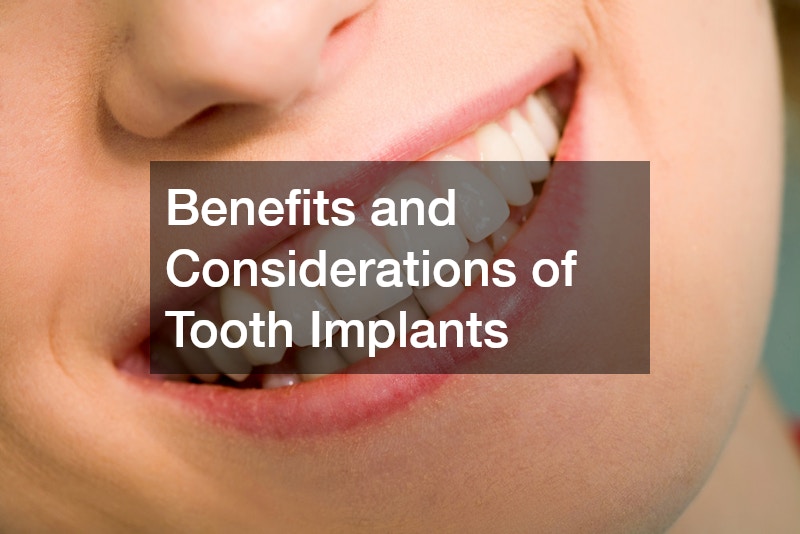Tooth implants have revolutionized dental care, offering a reliable solution for people who have lost one or more teeth. These implants are designed to blend seamlessly with your natural teeth, providing both functional and aesthetic benefits. Understanding when you need to consider tooth implants is crucial for long-term oral health and overall quality of life.
Many people are unaware of the significant impact missing teeth can have on their oral health. Over time, gaps in your teeth can lead to a shift in the alignment of your remaining teeth, exacerbating periodontal issues and increasing the risk of further tooth loss. Tooth implants can serve as a preventive measure against such dental complications, stabilizing your oral structure effectively.
Opting for tooth implants is not just about restoring a confident smile; it’s about maintaining your dental health. These durable replacements function much like natural teeth, supporting your jawbone health by mimicking the actions of natural tooth roots. This support can prevent bone loss, a common consequence of missing teeth, hence preserving the integrity of your facial structure.
Signs You Might Need Tooth Implants
One clear indicator that you might need tooth implants is difficulty chewing. Without full dental functionality, even simple tasks such as eating can become challenging, affecting your nutritional intake and overall health. If you’re experiencing persistent discomfort or pain while eating, it may be time to discuss tooth implants with your dentist.
Another sign to watch for is changes in your bite or the positioning of your cheeks. When teeth are missing, it creates voids that can lead to the shifting of adjacent teeth, drastically altering your bite and facial alignment. Observing these changes early and consulting a dental professional can determine whether tooth implants are a viable solution for maintaining your oral structure.
Chronic dental issues such as frequent infections and advanced periodontal disease may also necessitate consideration of tooth implants. Traditional dental treatments might not be sufficient in combating these persistent problems, especially if tooth loss has already occurred. By opting for tooth implants, you neutralize the escalation of infection and bolster your dental health against further issues.
The Process of Getting Tooth Implants
Undergoing a tooth implant procedure involves several steps that necessitate professional assessment and meticulous planning. Initially, your dentist will conduct a comprehensive evaluation to ensure that you are a suitable candidate for the procedure. This evaluation usually includes oral examinations, imaging, and discussions about your medical history.
Once deemed suitable, the next phase involves placing the implant into your jawbone, a process performed under local anesthesia for comfort. The implant, typically made from titanium, integrates with your jawbone over a period of several months in a process known as osseointegration. This integration is critical as it establishes a stable foundation for the artificial tooth, enabling it to function like a natural tooth root.
After successful osseointegration, the final component is attaching an abutment followed by the prosthetic tooth. This involves additional fittings to ensure the artificial tooth not only fits correctly but looks natural and aligns properly with the rest of your teeth. The entire process ensures that the tooth implant not only enhances your smile but also restores full dental functionality.
Benefits and Considerations of Tooth Implants
The primary benefit of tooth implants is the restoration of full dental functionality, allowing you to chew and speak without impediments. Unlike traditional dentures, which can slip and shift, tooth implants remain fixed in place, providing more stability and comfort. This stability also alleviates any speech issues that might arise from missing teeth or ill-fitting dentures.
Another advantage is the enhancement of oral health. Tooth implants do not require the alteration of surrounding teeth as a dental bridge might; this preserves more of your natural teeth. Furthermore, they aid in reducing bone loss and support overall facial structure, contributing to a more youthful appearance by maintaining jawline definition.
However, considering tooth implants also comes with a significant investment both financially and in terms of time. The procedure is extensive and can take several months to complete from start to finish, factoring in the time for healing and integration. It is crucial to discuss thoroughly with your dentist about all potential costs and the post-operative care needed to ensure successful outcomes.
Conclusion
Tooth implants present a robust solution for anyone dealing with the adverse effects of missing teeth. They not only enhance aesthetic appeal but also offer functional and health benefits that can profoundly affect your quality of life. It is important to stay informed and consult with dental professionals to determine the right solutions tailored to your specific dental needs.
.






